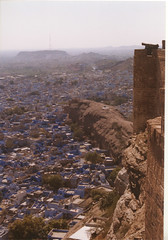The title of this post is a kind of academic joke. About 10 years ago, every essay dealing with globalization from a left-leaning perspective began with a hostile reference to Francis Fukuyama's
The End of History and the Last Man. It was, roughly, the same era when every essay of art criticism began with a reverential citation of Walter Benjamin's
"The Work of Art in the Age of of Mechanical Reproduction." Both are staples -- clichés in a sense. So I married the two, thinking,
won't these two clichés be happy together?While Fukuyama's book was sharply criticized, its fundamental inspiration -- that with the universalization of liberal democracy, the Hegelian progress of History is effectively over -- was too powerful for the left simply to ignore. Fukuyama's soundbite was very influential even in its wrongness. (LINKS: The introduction to the book is online
here;
here is a summary in the conservative
New Criterion magazine; and
Wikipedia's summary is excellent).
So what is Fukuyama saying now? I just read
Fukuyama's essay on Max Weber's
Protestant Ethic in today's
Times, and I can't find much to disagree with. This is a softer, smaller argument, one which will be much easier to digest than
The End of History. While the characterization of Weber's theory as "Karl Marx on his head" at the beginning of its essay is a bit crude, from that point on Fukuyama's appraisal of Weber seems reasonable to me. Fukuyama's summary of Weber's argument, for instance, is clear and effective:
Weber's argument centered on ascetic Protestantism. He said that the Calvinist doctrine of predestination led believers to seek to demonstrate their elect status, which they did by engaging in commerce and worldly accumulation. In this way, Protestantism created a work ethic -- that is, the valuing of work for its own sake rather than for its results -- and demolished the older Aristotelian-Roman Catholic doctrine that one should acquire only as much wealth as one needed to live well. In addition, Protestantism admonished its believers to behave morally outside the boundaries of the family, which was crucial in creating a system of social trust.
* * * *
One suspects that Fukuyama, like many other free-market ideologues, is interested in Weber for ideological reasons: for him, "Islam" stands in for Communism as the antithesis of American democracy, secularism, and Protestant-ethic capitalism. If that is the case, shouldn't Weber have something helpfully explanatory to say about Why They Hate Us, and Why It Doesn't Matter Because We'll Always Win? Well, no, and Fukuyama himself points this out in his measured critique of Weber's culturalism:
It is safe to say that most contemporary economists do not take Weber's hypothesis, or any other culturalist theory of economic growth, seriously. Many maintain that culture is a residual category in which lazy social scientists take refuge when they can't develop a more rigorous theory. There is indeed reason to be cautious about using culture to explain economic and political outcomes. Weber's own writings on the other great world religions and their impact on modernization serve as warnings. His book ''The Religion of China: Confucianism and Taoism'' (1916) takes a very dim view of the prospects for economic development in Confucian China, whose culture, he remarks at one point, provides only slightly less of an obstacle to the emergence of modern capitalism than Japan's.
What held traditional China and Japan back, we now understand, was not culture, but stifling institutions, bad politics and misguided policies. Once these were fixed, both societies took off. Culture is only one of many factors that determine the success of a society. This is something to bear in mind when one hears assertions that the religion of Islam explains terrorism, the lack of democracy or other phenomena in the Middle East.
This is something I strongly agree with. In my experience people often turn to "it's just our culture" when they want to justify regressive political practices (there was a reference to this in the recent movie
Swades...). And when looking at what is happening in, say, Iran, there is almost always a historical explanation that is far more concrete and in fact, actually
explanatory than the deadening refrain of "it's just their culture/religion... they're incapable of doing otherwise." Culture (and "religion" as an effectiely synonymous sub-category) are cop-outs, whether we are talking about ourselves, or Those Poor Saps Over There.
As for the points Fukuyama makes in the second part of the essay regarding Weber's usefulness in thinking about public religion in the contemporary world, the jury is still out for me. Fukuyama alludes to the fact that Weber's assumption that religion would disappear under capitalism turns out to be wrong. I'm glad Fukuyama points out that this isn't just limited to the Islamic world, or other regions of the non-western world:
But it goes without saying that religion and religious passion are not dead, and not only because of Islamic militancy but also because of the global Protestant-evangelical upsurge that, in terms of sheer numbers, rivals fundamentalist Islam as a source of authentic religiosity. The revival of Hinduism among middle-class Indians, or the emergence of the Falun Gong movement in China, or the resurgence of Eastern Orthodoxy in Russia and other former Communist lands, or the continuing vibrancy of religion in America, suggests that secularization and rationalism are hardly the inevitable handmaidens of modernization.
Yes. People are perfectly capable of being modern, rational, and secular and also continue to express religious beliefs. And it's global: America proves this. India proves this. Turkey, under Erdogan, almost proves this.
That said, I do disagree with Fukuyama on whether "humanism," which according to Fukuyama is dominant in Europe after Christianity, carries some residual religious power:
Europeans may continue to use terms like "human rights" and "human dignity," which are rooted in the Christian values of their civilization, but few of them could give a coherent account of why they continue to believe in such things. The ghost of dead religious beliefs haunts Europe much more than it does America.
I don't see why that has to be the case. It's equally possible to describe humanism in terms completely dissociated from religious ethics. One gets suspicious whenever a historian says the word "haunted"; negative arguments are impossible to prove.






















